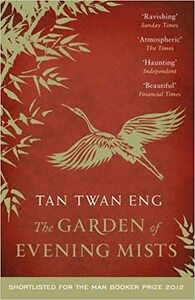You need to sign in or sign up before continuing.
Take a photo of a barcode or cover
I'm not sure I fully understand this book, which makes it hard to review. Like its titular Japanese Garden, key points of the plot and character development are suggested by what is NOT revealed, by negative space and shadows. I'm left feeling like I should read the whole thing again, looking at each word, and the space between them, a little more closely. While there are distinct plot points that can be considered spoilers, the spirit and motivations of the characters are concealed and sometimes ambiguous.
One thing I can say for sure is that I know so much about Malaysian history and the Japanese occupation of southeast Asia during World War II having read this book. I had no idea what collective traumas lay under the sheen of Kuala Lumpur and the fragrance of the rural hills when I visited Malaysia years ago. I appreciate the author's placemaking and scene-setting.
I also appreciate the commitment to characters with complex histories--there's not an innocent in the story, apart from perhaps Emily. The protagonists are colonizers, prosecutors, warmongers, profiteers, and elites. We don't get to know the indigenous. We don't get to know the poor. We don't get to know the communists. Instead, we're left with an impression of what people can do when inflicted with trauma, and sometimes power and resources.
One thing I can say for sure is that I know so much about Malaysian history and the Japanese occupation of southeast Asia during World War II having read this book. I had no idea what collective traumas lay under the sheen of Kuala Lumpur and the fragrance of the rural hills when I visited Malaysia years ago. I appreciate the author's placemaking and scene-setting.
I also appreciate the commitment to characters with complex histories--there's not an innocent in the story, apart from perhaps Emily. The protagonists are colonizers, prosecutors, warmongers, profiteers, and elites. We don't get to know the indigenous. We don't get to know the poor. We don't get to know the communists. Instead, we're left with an impression of what people can do when inflicted with trauma, and sometimes power and resources.
dark
emotional
reflective
sad
slow-paced
Plot or Character Driven:
Character
Strong character development:
Yes
Loveable characters:
Complicated
Diverse cast of characters:
No
Flaws of characters a main focus:
Yes
dark
emotional
reflective
medium-paced
Plot or Character Driven:
A mix
Strong character development:
Yes
Loveable characters:
Complicated
Diverse cast of characters:
Yes
Flaws of characters a main focus:
Yes
challenging
dark
emotional
reflective
sad
medium-paced
Plot or Character Driven:
Character
Strong character development:
Yes
Loveable characters:
Yes
Diverse cast of characters:
Yes
Flaws of characters a main focus:
Yes
The Garden of Evening Mists follows Yun Ling, the lone survivor of a Japanese internment camp who went on to study law and then prosecuted Japanese war criminals. Her desire to create a Japanese garden in memory of her sister brought her into the orbit of Aritomo, the exiled former gardener of the Emperor of Japan, and forms the core of this novel. I was hooked from the opening line - "On a mountain above the clouds once lived a man who had been the gardener of the Emperor of Japan" - and my interest never let up. The writing was gorgeous, lushly atmospheric in places, especially when evoking the Malayan highlands, but more sparse and austere in others, which was in keeping with the protagonist's demeanor. The characters were well-developed, complex, morally ambiguous, and somewhat enigmatic - but in a way that felt authentic rather than manipualtive. This was a character driven novel, slow paced and discursive, which gave the novel a real depth and richness. As well as Malayan history, particularly the Malayan Emergency, in-depth information on a host of other subjects, including tea plantations, archery, Zen philosophy, tea ceremonies, colonialism, and Japanese tattoos was incorporated. I liked the way it left me with things to think about, most natably the juxtaposotion of beauty and brutality. The book was sometimes a little structurally challenging in the way it moved between the three main timelines - WWII, the 1950s when Yun Ling was trying to build the garden, and the 1980s when she was having health problems and returned to the highlands to make sense of her past and write down her memories before she no longer could. Any effort involved in settling into the story was well rewarded, and this book has left me keen to read Tan's debut novel, The Gift Of Rain, the one of his three I've yet to read.
Graphic: Rape, Violence, Colonisation, War
Loved this book. I felt sad as it came to end. Eng creates a wonderful atmosphere stirring the lushness of Malaysia with an uncanny silence and peace.
adventurous
challenging
dark
emotional
hopeful
informative
reflective
sad
tense
medium-paced
Plot or Character Driven:
Character
Strong character development:
Yes
Loveable characters:
Yes
Diverse cast of characters:
Yes
Flaws of characters a main focus:
Yes
I was not emotionally prepared and this book has ended me. However, it is simply exquisite…I wish I was articulate enough to express how beautifully ingenious the storytelling is.
I definitely had my doubts until the second half/final third - but the way it all comes together in the end is flawless and so I can make no complaint.
I definitely had my doubts until the second half/final third - but the way it all comes together in the end is flawless and so I can make no complaint.
The Garden of Evening Mist by Tan Twan Eng audiobook narrated by Anna Bentinck. Published by W.F. Howes, listened to using Listening Books a charity providing audiobooks for people who finding reading physical books more difficult via Libby. 4 stars
Short listed for the Man Booker prize 2012 this a beautifully written story. Set in Malaya the main character Yun Ling Teoh, who was the sole survivor of a Japanese POW camp finds herself helping with the prosecution of Japanese war criminals. While at the POW camp Yun Ling with her sister plans their ultimate Japanese garden. After returning to near her childhood home in the mountains she discovers Aritomo the exiled former gardener of the Emperor of Japan. When he refuses to do the garden for her, he tells her he will train her “until the monsoon comes” and she can make her own garden.
As the months pass she finds herself being drawn towards him and slowly overcoming her prejudice of the fact he is Japanese.
Short listed for the Man Booker prize 2012 this a beautifully written story. Set in Malaya the main character Yun Ling Teoh, who was the sole survivor of a Japanese POW camp finds herself helping with the prosecution of Japanese war criminals. While at the POW camp Yun Ling with her sister plans their ultimate Japanese garden. After returning to near her childhood home in the mountains she discovers Aritomo the exiled former gardener of the Emperor of Japan. When he refuses to do the garden for her, he tells her he will train her “until the monsoon comes” and she can make her own garden.
As the months pass she finds herself being drawn towards him and slowly overcoming her prejudice of the fact he is Japanese.
challenging
dark
emotional
slow-paced
What a great story teller...the author weaves from past to present flawlessly. Intriguing story line which kept me engaged throughout the book.




